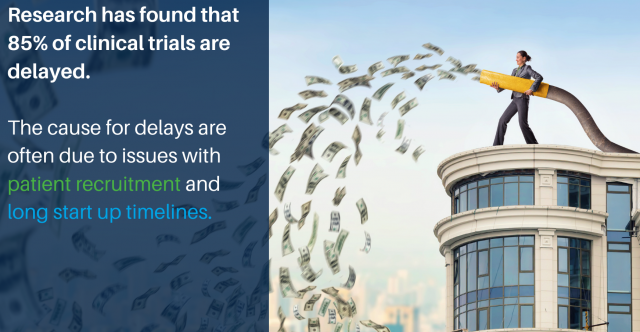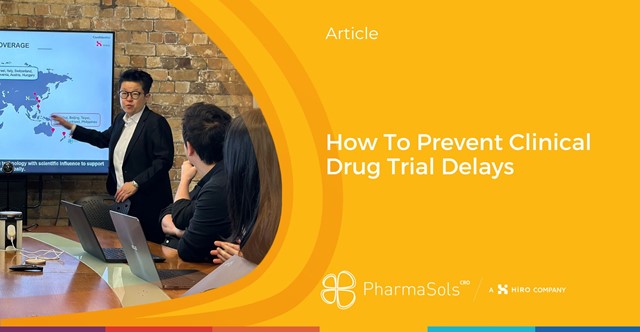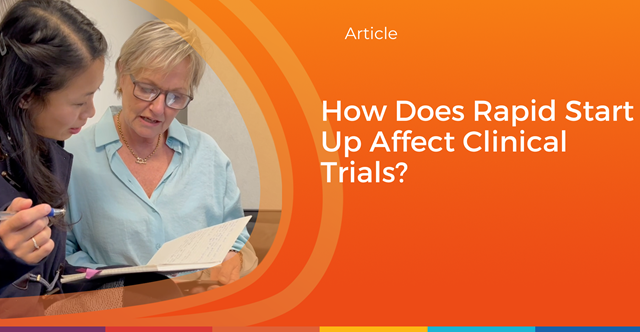12 Apr
The Cost of Delaying A Trial

From discovery and development through to market, the life cycle of new medicine is a profoundly complex process, frequently met with obstacles.
Research produced by PhRMA found that clinical trials take on average six to seven years to assess safety and efficiency, with the overall probability of success less than 12%[1].
The extensive timeline of these trials demonstrates the amount of time, resources, and money poured into them. But what causes trials to take such an extreme length of time, and why do they often result in failure?
What Delays Trials
Research has found that 85% of clinical trials are delayed[2]. The cause for delays are often due to issues with patient recruitment and long start up timelines.
Problems with patient recruitment and retention have been a constant source of delays for years. While it is often a struggle to attract trial participants, some studies also find it difficult, even impossible, to find suitable patients to begin with. High rates of low patient retention in study results in considerable loss of valuable data. This could impact the primary endpoint and affect the overall cost and resource of conducting the trial. Additional trial participants will then need to be recruited to ensure sufficient trial outcomes. Ultimately, these delays can mean the total failure of the trial itself and unrepairable time delays.
Complications with participants are not the only interference studies have to face. A critical yet often overlooked phase of a trial is the start-up. It is here that most of the delays occur.
In a study conducted by Tufts, researchers found that it takes nearly eight months on average to start a study[3]. This lag in start up can rush the rest of the trial timeline, leading to improper site selection and further interference with patient recruitment.
The Financial Cost
Clinical trials that are interrupted, altered, postponed, or even cancelled have huge financial implications.
PhRMA also found that the average cost of a successful drug trial to be around $2.6 billion. Incorporated in that cost are delays, which can be thousands or even millions of dollars. The cost per day can fall anywhere between $600,000 to $8 million.[4]
Data collected by Clinithink found that 10% of a trial's budget is dedicated to patient recruitment[5]. With recruitment and retention being the primary reasons for delays, it can sometimes feel like money down the drain.
Site selection, the most significant element in a study start up, is estimated to cost up to $30,000[6]. With improper site selection being a consistent issue, these costs can be even higher.
The Human Cost
The financial burden of delays is evident. However, there is an additional cost to these delays.
While trial budgets will feel the sting of delays, the human cost is the most significant.
The length of time it takes trials to initiate only prolongs the time it takes for these new medicines and devices to reach their intended patient population.
The statistics around clinical trial delays can look distressing, especially when considering how avoidable some of the pitfalls are.
Pharmaceutical Solutions can help.
What can be done
Combating issues with start ups and patient recruitment and retention can both be solved by selecting regions that have been historically successful in these areas. Australia and New Zealand have one of the fastest regulatory approval rates in the world. There is no requirement for US Pre-Investigational New Drug submission to initiate first-in human clinical trials.
Our effective processes mean ethics and regulatory approval and first site initiation visit can be achieved in 35 days.
Australia and New Zealand are also highly regarded for their success with patient recruitment and retention. Trial stats from ANZCTR show that between 2015 and 2020, patient recruitment exceeded expectations, resulting in 103% retention of patients[2].
Early engagement between the sites and the sponsor has been shown to improve recruitment efforts through the relationships formed. The stronger the relationship from the outset, the better the trial outcome.
Identifying a lead site to review a draft protocol is invaluable. If the protocol design is too complex, these conditions might discourage physicians from referring participants to the trial.
Dissemination of study results to the trial participants helps with retention in future trials, creates a positive feeling associated with their trial participation, and conveys that their involvement was valuable.
The next best thing you can do to ensure that your trial is not hindered by delays is by aligning yourself with the right CRO. Pharmaceutical Solutions is the longest established, best connected CRO in the Pacific region. With 20 years of international experience, our team is dedicated to providing flexible, responsive, and innovative solutions to studies. Pharmaceutical Solutions has a network of research professionals that can ensure your trials success.
Site Selection
At Pharmaceutical Solutions, we know our sites, and we leverage this position to ensure the correct sites are selected that can recruit and deliver on your project.
We also always look at a backup site option that can be implemented early in the trial timeline if the trial is not meeting enrolment targets.
Rapid start up services and accelerated ethics and regulatory timeframes
Has your study been delayed? Or do you need assistance with getting ethics and regulatory approval? Pharmaceutical Solutions can help.
Pharmaceutical Solutions has a specially dedicated team to start your study, who will work with you from your first meeting through to site initiation and will provide ongoing reporting.
Reach out and leverage our expertise.
Sources:
1 PhRMA (2015) Biopharmaceutical Research & Development: The Process Behind New Medicines
2 Facts about clinical trials. (Online) Available at: http://www.arena-international.com/clinicaltrials/facts-about-clinical-trials/1063.article (Accessed 08/03/2020)
3 Accelerating Study Start-Up: The Key to Avoiding Trial Delays (Online) Available at: https://acrpnet.org/2017/02/01/accelerating-study-start-up-the-key-to-avoiding-trial-delays/ (Accessed: 08/03/2020)
4 Accelerating Study Start-Up: The Key to Avoiding Trial Delays (Online) Available at: https://acrpnet.org/2017/02/01/accelerating-study-start-up-the-key-to-avoiding-trial-delays/
5 Clinithink (2017) A Paradigm Shift in Patient Recruitment for Clinical Trials
6 Accelerating Study Start-Up: The Key to Avoiding Trial Delays (Online) Available at: https://acrpnet.org/2017/02/01/accelerating-study-start-up-the-key-to-avoiding-trial-delays/ (Accessed: 08/03/2020)
7 Australia New Zealand Clinical Trials Register (2015-2020) Commercial Trials
Other News
March 2024 (1)
February 2024 (1)
December 2023 (1)
November 2023 (1)
October 2023 (1)
September 2023 (2)
August 2023 (1)
July 2023 (1)
June 2023 (2)
May 2023 (3)
April 2023 (1)
March 2023 (2)
The Go-to region for clinical trials (1)
HiRO – our global advantage, tailored solutions and key partnerships (1) (1)
HiRO – an emerging full-service global CRO (1)
HiRO – Top CRO in APAC 2022 (1) (1)
November 2022 (1)
October 2022 (1)
September 2022 (1)
August 2022 (1)
July 2022 (1)
June 2022 (1)
May 2022 (1)
April 2022 (1)
March 2022 (1)
January 2022 (1)
December 2021 (1)
November 2021 (1)
October 2021 (2)
September 2021 (2)
August 2021 (3)
July 2021 (3)
June 2021 (2)
May 2021 (1)
April 2021 (2)
March 2021 (1)
February 2021 (1)
December 2020 (5)
November 2020 (1)
October 2020 (5)
September 2020 (1)
August 2020 (2)
May 2020 (5)
January 2024 (0)



